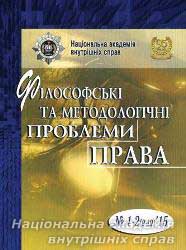Axiology of Law as a Constituent of Philosophy of Law
Keywords:
law, human being, axiology, dialectology, legal values, legal activity
Abstract
Axiology of law investigates the value aspect of law, namely values of law, legal values and right as a value, and also value aspect of jurisprudence as scientific and educational discipline. Values of law are common to all mankind values that are inculcated by a right in life of society. They are a person, his life, freedom, equality, justice and so on. Legal values are created by a right for implementation of common to all mankind values into public life – law and order, human rights, sense of justice, norms of law and so on. A right is created foremost for organization of public life in accordance with common to all mankind values, that means it has an instrumental value; in addition, it has its own value. The value of the right has also personal and general social character. Jurisprudence as a scientific and educational discipline has an axiological aspect. Axiology of law is dialectically related to other basic constituents of philosophy of law as science – legal ontology, anthropology, epistemology and praxeology and has an important place in philosophy of law.Downloads
Download data is not yet available.
Abstract views: 2339 PDF Downloads: 1137
Issue
Section
Specific Areas of Legal Philosophy (Ontology, Gnoseology, Anthropology, Praxeology)
Copyright (c) 2017 Philosophical and Methodological Problems of Law

This work is licensed under a Creative Commons Attribution-NonCommercial-NoDerivatives 4.0 International License.
- Authors reserve the right to authorship of their own work and transfer to the magazine the right of the first publication of this work under the terms of the Creative Commons Attribution License, which allows other persons to freely distribute published work with mandatory reference to authors of the original work and the first publication of an article in this magazine.
- Authors have the right to enter into separate additional agreements on non-exclusive dissemination of the work in the form in which it was published in the journal (for example, to post an article in the institution's repository or to publish as part of a monograph), provided that the link to the first publication of the work in this journal is maintained.
- The journal's policy allows and encourages the posting of articles by authors on the Internet (for example, in electronic storehouses of institutions or on personal websites), both before the submission of this manuscript to the editorial office and during its editorial processing, as this contributes to the creation of a productive scientific discussion and positively affects the efficiency and dynamics of citing the published work.




